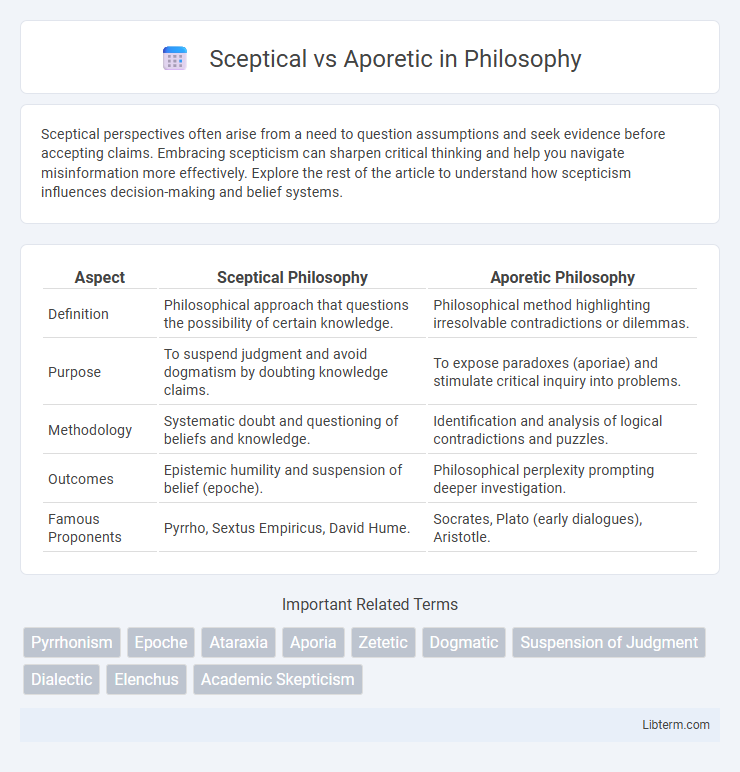Sceptical perspectives often arise from a need to question assumptions and seek evidence before accepting claims. Embracing scepticism can sharpen critical thinking and help you navigate misinformation more effectively. Explore the rest of the article to understand how scepticism influences decision-making and belief systems.
Table of Comparison
| Aspect | Sceptical Philosophy | Aporetic Philosophy |
|---|---|---|
| Definition | Philosophical approach that questions the possibility of certain knowledge. | Philosophical method highlighting irresolvable contradictions or dilemmas. |
| Purpose | To suspend judgment and avoid dogmatism by doubting knowledge claims. | To expose paradoxes (aporiae) and stimulate critical inquiry into problems. |
| Methodology | Systematic doubt and questioning of beliefs and knowledge. | Identification and analysis of logical contradictions and puzzles. |
| Outcomes | Epistemic humility and suspension of belief (epoche). | Philosophical perplexity prompting deeper investigation. |
| Famous Proponents | Pyrrho, Sextus Empiricus, David Hume. | Socrates, Plato (early dialogues), Aristotle. |
Understanding Skepticism and Aporeticism
Skepticism involves questioning knowledge claims by doubting the possibility of certainty, emphasizing critical inquiry and suspension of judgment. Aporeticism centers on recognizing and exploring philosophical puzzles or contradictions called aporias, where no clear resolution is attainable. Understanding skepticism and aporeticism requires grasping how both challenge assumptions but differ in seeking clarity versus highlighting irresolvable problems.
Historical Origins of Skepticism
Skepticism originated in ancient Greek philosophy, particularly with Pyrrho of Elis in the 4th century BCE, who is considered the founder of Pyrrhonian skepticism characterized by aporetic doubt--suspension of judgment due to perceived equal evidence on opposing sides. Academic skepticism, developed by Plato's Academy under Arcesilaus and Carneades, emphasized a more systematic approach to questioning knowledge claims, relying on probabilistic reasoning rather than outright disbelief. The distinction between sceptical and aporetic approaches emerged from these traditions, with sceptical philosophy focusing on questioning knowledge certainty and aporetic methods highlighting the persistent puzzlement and unresolved contradictions at the heart of epistemic inquiry.
The Roots of Aporetic Thought
Aporetic thought originates from ancient Greek philosophy, particularly the works of Socrates and Plato, emphasizing profound puzzlement and unresolved questions that challenge assumed knowledge. This approach contrasts with skepticism by not merely doubting beliefs but actively engaging in critical inquiry to reveal contradictions within established doctrines. The roots of aporetic thought lie in dialectical methods that provoke deeper reflection and intellectual humility, fostering a foundational environment for philosophical and epistemological exploration.
Defining Sceptical Philosophy
Sceptical philosophy centers on questioning the possibility of certain knowledge by systematically doubting beliefs and claims to truth. It challenges assumptions through critical examination, emphasizing suspension of judgment to avoid error and dogmatism. Unlike aporetic approaches that highlight irresolvable puzzles, scepticism seeks to cultivate intellectual humility and ongoing inquiry.
What Makes an Argument Aporetic?
An aporetic argument is characterized by the presence of irresolvable contradictions or puzzles that challenge clear resolution, distinguishing it from merely sceptical positions that doubt knowledge claims without necessarily encountering logical paradoxes. It involves presenting conflicting premises that appear equally plausible yet lead to contradictory conclusions, thereby creating an impasse or aporia. The defining feature of an aporetic argument lies in its ability to expose deep conceptual tensions that resist straightforward solutions, prompting ongoing philosophical inquiry.
Scepticism in Ancient and Modern Contexts
Scepticism in ancient philosophy, notably practiced by Pyrrhonists and Academic Skeptics, emphasizes suspending judgment to achieve mental tranquility, challenging dogmatic claims about knowledge and reality. In contrast, modern scepticism often intersects with scientific inquiry and critical thinking, promoting doubt as a method to test hypotheses and avoid cognitive biases. Both contexts share a fundamental distrust of certainty but differ in their approaches: ancient scepticism leans toward epistemic quietism, while modern scepticism fosters provisional acceptance based on empirical evidence and rational evaluation.
Aporetic Method in Philosophical Inquiry
The Aporetic method in philosophical inquiry centers on exposing deep perplexities and contradictions within beliefs to stimulate rigorous questioning and reflection. By systematically presenting aporias--puzzling impasses where reason grapples with unresolved tensions--this approach encourages critical examination rather than immediate resolution. Unlike skeptical approaches that often suspend judgment, the Aporetic method fosters sustained dialectical engagement aimed at uncovering foundational problems and advancing philosophical understanding.
Key Differences Between Sceptical and Aporetic Approaches
Sceptical approaches emphasize doubt and the suspension of judgment regarding knowledge claims, often questioning the certainty and possibility of true knowledge. Aporetic approaches involve identifying and analyzing paradoxes or puzzles (aporia) that challenge logical or philosophical frameworks, prompting deeper inquiry rather than outright denial of knowledge. The key difference lies in scepticism's focus on withholding belief due to uncertainty, whereas aporeticism centers on exploring conceptual difficulties to stimulate reflective examination.
Sceptical vs. Aporetic: Impact on Knowledge and Belief
Sceptical approaches challenge the certainty of knowledge by questioning the possibility of absolute truth, fostering ongoing inquiry and critical examination of beliefs. Aporetic perspectives highlight irresolvable puzzles or contradictions that expose limits in understanding, prompting deeper investigation without necessarily rejecting all claims. Both frameworks influence epistemology by encouraging humility in belief formation and driving continuous refinement of knowledge systems.
Relevance Today: Choosing Sceptical or Aporetic Perspectives
Sceptical perspectives challenge established knowledge by emphasizing doubt and questioning certainty, making them highly relevant in today's climate of misinformation and rapid information exchange. Aporetic approaches embrace unresolved paradoxes and complexities, fostering critical thinking and deeper inquiry in philosophical and scientific debates. Choosing between sceptical or aporetic frameworks depends on whether the goal is to scrutinize assumptions rigorously or to explore ambiguities constructively in contemporary discourse.
Sceptical Infographic

 libterm.com
libterm.com